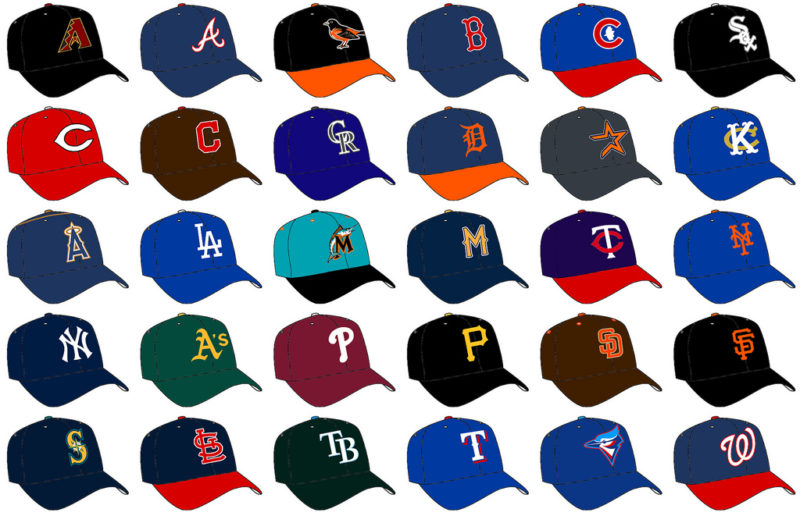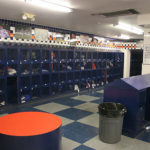Ever wondered how professional sports teams got their wacky names? Here’s the history behind a few, excerpted from Kathryn and Ross Petras’s The Stupidest Sports Book of All Time.
Buy the New Edition
Indiebound | B&N | Amazon | Workman

BALTIMORE RAVENS: When you think football, writers with a bent for the macabre—like, say, Edgar Allan Poe—don’t usually come to mind. But in the case of the Ravens, they should. The Baltimore Sun polled their readers to come up with a name for the new football team, and “Ravens” won, in honor of one-time Baltimore resident Poe and his spine-tingling poem “The Raven.” Ravens beat out the far less literary Americans, Marauders, Mustangs, and Railers.
BOSTON CELTICS: When the team was founded in 1946, Celtics won out over the Olympians, the Whirlwinds, and (believe it or not) the Unicorns, since, as original team owner Walter Brown sagely and succinctly put it, “Boston is full of Irishmen.”
DALLAS COWBOYS: Cowboys was actually the third choice for a name. First, while still being formed, they were the Steers. But general manager Tex Schramm correctly pointed out that “you don’t want your whole football team being castrated.” So then they were the Rangers . . . until the execs decided that they might be confused with the Dallas Rangers minor league baseball team. So it was onto choice number three, the Cowboys.
GREEN BAY PACKERS: The oldest team name in the NFL, dating back to 1919, belongs to the Packers. Cofounder Curly Lambeau got his employer at the time to sponsor the team (to the tune of $500—nearly $7,000 nowadays) and agreed to give them publicity by having the team wear their name. The company? The Indian Packing Company (producers of canned brand Council Meats, including beloved favorites like veal loaf, potted meat, and the ever-popular tripe).
HOUSTON ASTROS: The Astros became the replacement name for the politically not-so-correct but quite catchy Colt 45s in 1965, when newly formed NASA opened their headquarters in Houston. And their name wasn’t the only space-age thing about them. They were the first MLB team to use artificial turf, then called “chemgrass,” but known colloquially (and later officially) as Astroturf because of the Astros.
KANSAS CITY ROYALS: Most people probably think of kings and queens when they hear this name. But in typical Midwest fashion, the Royals are actually named after cattle. It was the winner of another “name the team” contest held in 1969. “Royals” was a nod to Kansas City’s large-scale cattle business, specifically, as the winner explained, “the nationally known American Royal Livestock and Horse Show.”
LOS ANGELES DODGERS: Formerly the Brooklyn Dodgers, they were named after a very New York City kind of action—dodging traffic, or in this case, trolley cars. So they were the Brooklyn Trolley Dodgers, which was shortened to Dodgers. Before that they suffered through a few less catchy names, starting as the Brooklyn Atlantics, then the Grays, Bridegrooms (when six team members got married in 1880), Superbas, and Robins. But Dodgers was the name that stuck, even when the team moved to car-centric Los Angeles.
NEW YORK RANGERS: It started out as a pun and wound up the official name of the team. When Madison Square Garden owner Tex Rickard was awarded an NHL hockey team in 1926, clever sportswriters began calling the team Tex’s Rangers, as in Texas (police) Rangers, and it caught on.
NEW YORK YANKEES: The Yankees started out as the New York Highlanders—either because they played at Hilltop Park (one of Manhattan’s highest points), or because their president, Joseph Gordon, was of Scotch-Irish background and named the team after the Gordon Highlanders, a renowned Scottish military unit. But the press dubbed them the Americans, as was common for all American League teams at the time. In 1904, the sports editor of the New York Press started calling them Yankees or Yanks because it was shorter and t easily into headlines. In 1913, they moved from Hilltop Park to the lower-level Polo Grounds and officially took the name Yankees.
OAKLAND RAIDERS: If the Raiders had stuck with their original name, fans would be rooting for the Oakland Señors, the winner of the Oakland Tribune’s “name the team” contest in 1960. Amid speculation that the x was in (because real estate developer and original team owner Chet Soda called his business colleagues “señor”) and a lot of jeering from would-be fans who thought the name was ridiculous, management said adios to the Señors only nine days later . . . and hola to the Raiders (which placed third in the contest after “Lakers”).
PHILADELPHIA EAGLES: Perhaps you thought they were called the Eagles because of Philadelphia’s prominent place in American revolutionary history. But the Eagles name drew inspiration from Franklin Delano Roosevelt’s New Deal in 1933. Specifically, the agency that oversaw the New Deal, the National Recovery Administration, had an eagle as its insignia. Owner Bert Bell liked both the agency and the iconic symbol, and hoped his team would have a new deal as well. It turns out Keynesian de cit spending can raise employment levels but not a Lombardi Trophy—the Eagles have yet to win a single Super Bowl.
PITTSBURGH STEELERS: It’s a bit of a convoluted history, because there has been a long list of names for the venerable Pittsburgh Steelers. When the franchise first started in 1933, they were the Pirates, named after the hometown baseball team. Then, in 1939, they became the Steelers. In 1940, owner Art Rooney sold the team to buy half ownership of the Philadelphia Eagles and the new owner, Alexis Thompson, planned to rename the team the Iron Men. The two owners decided to trade franchises, and Rooney changed his Eagles team to the Steelers, while Thompson changed his Iron Men to the Eagles before they’d even played a game. (Confused yet?) In 1943, the Steelers merged with the Eagles and unofficially became the Steagles, but only a season later, they merged with the Chicago Cardinals and became Card-Pitt—an even more unfortunate name. To make matters worse, their miserable win-loss (more like loss-loss) record encouraged people to call them the “Carpets,” because everyone walked over them. Then, in 1944, they were the Steelers again. This time around the name stuck, and with the team winning six Super Bowls—the most of any NFL franchise—no one has seen fit to change it again.
SAN FRANCISCO GIANTS: Paging Batman. The Giants were originally the Gothams, nodding to the nickname used for New York City since the nineteenth century. According to baseball legend, in 1885 Gothams manager Jim Mutrie called them “giants” after they played particularly well, and the nickname stuck even after a cross-country move to San Francisco in 1958.
ST. LOUIS CARDINALS: Beginning as the St. Louis Browns, the team changed their name to the Perfectos in 1898 (easily one of the greatest nicknames in sports history). But the name turned out to be not-so-perfecto. A local sportswriter overheard a fan remark about their red-striped socks, “What a lovely shade of cardinal!” and began calling the team the Cardinals in his column. Fans liked the new nickname and it became official.
UTAH JAZZ: When you think “Utah,” you automatically think “jazz,” right? Yes, this is one of those “huh?” sports names, particularly if you didn’t know that the Jazz were originally an NBA expansion team from New Orleans. The name was a finalist (along with Dukes, Crescents, Pilots, Cajuns, Blues, Deltas, and Knights) in yet another “name the team” contest, held back in the Big Easy in 1974. The management decided that Jazz was a winner—but the team wasn’t. After placing last in the 1978–79 season standings, the owners shook things up by moving to Salt Lake City, home of, well, not jazz. But they kept the name anyway, and even stuck with the Mardi Gras–themed purple, gold, and green team colors.

The Stupidest Sports Book of All Time





No Comments